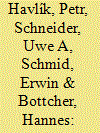| Srl | Item |
| 1 |
ID:
109599


|
|
|
|
|
| Publication |
2011.
|
| Summary/Abstract |
Recently, an active debate has emerged around greenhouse gas emissions due to indirect land use change (iLUC) of expanding agricultural areas dedicated to biofuel production. In this paper we provide a detailed analysis of the iLUC effect, and further address the issues of deforestation, irrigation water use, and crop price increases due to expanding biofuel acreage. We use GLOBIOM - an economic partial equilibrium model of the global forest, agriculture, and biomass sectors with a bottom-up representation of agricultural and forestry management practices. The results indicate that second generation biofuel production fed by wood from sustainably managed existing forests would lead to a negative iLUC factor, meaning that overall emissions are 27% lower compared to the "No biofuel" scenario by 2030. The iLUC factor of first generation biofuels global expansion is generally positive, requiring some 25 years to be paid back by the GHG savings from the substitution of biofuels for conventional fuels. Second generation biofuels perform better also with respect to the other investigated criteria; on the condition that they are not sourced from dedicated plantations directly competing for agricultural land. If so, then efficient first generation systems are preferable. Since no clear technology champion for all situations exists, we would recommend targeting policy instruments directly at the positive and negative effects of biofuel production rather than at the production itself.
|
|
|
|
|
|
|
|
|
|
|
|
|
|
|
|